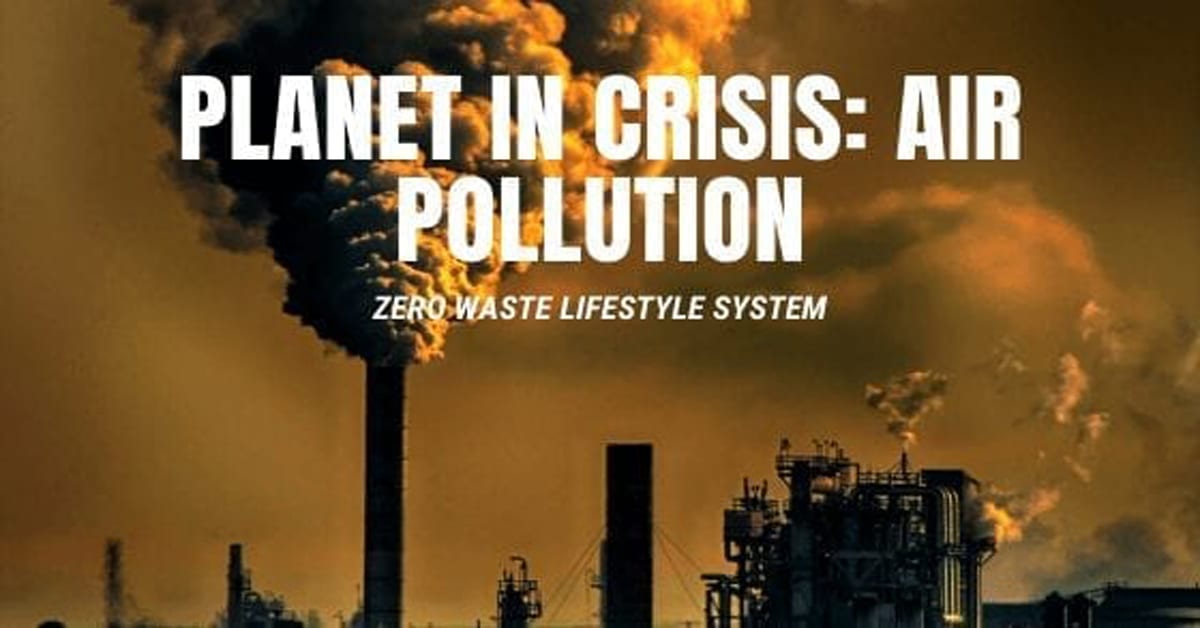According to World Health Organization (WHO), approximately 4 million people die each year due to air pollution. This is nearly as large as the population of Georgia in Asia and Eritrea in Africa (as of August 2019). In May 2016, however, the amount increased up to 7 million, twice the first report from the same international organization. The average keeps getting bigger per year. Due to this, people fear the worst scenario.
How can we solve this serious global crisis? What efforts should we put to “heal” the environment? The solution lies on what we know, and what we do to minimize, if not eradicate, this life threatening phenomenon. First, let us define air pollution.
What is Air Pollution?
According to the National Geographic, air pollution refers to a contamination caused by a mixture of “particles and gases that can reach harmful concentrations.” Some of these particles are natural such as noxious gases, molds, and even pollens. It can also be man-made including tobacco smokes and aerosol sprays. These substances are also called air pollutants.
The atmosphere holds specific types and amount of substances which makes up its layers. When a physical, biological, or chemical alteration takes place, pollution occurs. This happens when foreign or similar particles enter the atmosphere from smoke, dust, and noxious gases.
Places that suffer from air pollution
Everyone is affected by air pollution. Living things depend greatly on the gases that are normally present in the air. For instance, humans and animals breathe in oxygen. If the air becomes contaminated, their health will be put to risk.
Pause and ask yourself this: Why is Earth the only planet suitable for living? You might already have the answer. If you think it is because Earth is the only globe which contains an atmosphere that has the essential gases we need to survive, then you are right. If the air is polluted, we also inhale the dirt. This will then lead to premature deaths due to diseases. Stakes may be more serious than we think.
Effects of air pollution are felt unequally all over the world. Does this mean industrialized First World countries suffer from it the most? No. It might surprise you, but Third World countries hurt the most in this situation. According to United Nations, the most number of pollution-related deaths are from the poorest countries, “where laws are weak or not applied, vehicle emission standards are less stringent and coal power stations more prevalent.”
This is the case in some countries in the world such as Africa. In Dandora, Kenya, a smouldering dump site lies next to schools, churches, clinics and shops. This affects their health, especially children.
Even in cities, the underprivileged are pressed the most. Most of the poorest families in the city live in squatters. Some, even dwelling in dump sites or near factories. In addition, their. This sure has a toll in the overall well-being.
What causes air pollution?
Various human activities contribute to the contamination of the atmosphere. For instance, when factories burn fossils fuels, harmful gases are released in the air. One of which is sulfur dioxide, a toxic gas responsible for the formation of acid rain.
Vehicles run by petrol is also considered as a form of burning fossil fuels. The smoke emitted from cars, trucks, trains, and airplanes contributes to a large sum of pollution in the air worldwide.
Meanwhile, people should monitor agricultural activities, too. The use of fertilizers, insecticides, and pesticides emits toxic chemicals in the air. It can even have instant effect to the farmer’s health if inhaled. In addition, it is the primary cause of the production of ammonia, one of the most harmful gases in the atmosphere.
Some areas might not be agricultural, but if mining operations are eminent in that place, risks in the depletion of quality air is at stake. In this sector, petroleum refineries are used which release hydrocarbons and other pollutants. If taken, effects of hydrocarbons may be as serious as heart failure and comatose.
Is home the safest place to dwell to get rid of air pollution? The answer is no. In fact, some of the chores we do at home may added to pollution. This is called indoor pollution. Painting supplies, cleaning products, and even cosmetics, may be made with particles or gases that poison the air. It may not be as obvious as we think, but they do toxify the air we breathe.
Is this all we should watch out for? The sad thing is, people fear the worst scenario due to the recent reports on wildfire in Brazil and bushfire in Australia. These two events are significantly related to the global crisis on air pollution. How so?
First, let us go back to the definition of air pollution. As explained, contamination in the air happens when harmful gases and particles mix in the atmosphere. Both fires released a large amount of carbon dioxide in the air. Though this compound is normally absorb by plants for photosynthesis, a huge amount of trees has already been wiped out. The tendency is for the gas to spread all over the world. What the plants cannot catch, we take.
Aside from that, the fires produced small particles that when combined with the air, becomes very dangerous. This may be invisible in the human eye, but inhaling this will damage the respiratory system. It can even bring death.
Effects of air pollution
Air pollution has disastrous effects. It is responsible for the deaths of millions around the world. Specifically, the air pollution targets our respiratory system. If the air in the place we live is polluted, the higher change we get respiratory and heart problems.
It also harms the wildlife. Toxic chemicals in the air can be considered as a threat to them. This may force them to evacuate and change their habitat. If conditions are not favorable when they leave, they die.
Going back to the atmosphere, foreign gases that accumulate in the upper layer which may block the escape of sunlight from earth. This is also known as greenhouse effect, a phenomenon that leads to global warming.
If the particles reach the ozone, another possibility may occur. The substances from air pollutants may react to the ozone (O3) and breakdown the barrier (ozone depletion). For instance, if carbon dioxide reached the ozone, an oxygen molecule may have combined with the other oxygen molecule of ozone. This will create carbon monoxide (CO) as a by-product. It will also leave a hole in the protective layer, enabling the harmful ultraviolet (UV) rays inside our planet.
Lastly, it may cause acid rain and eutrophication. Both of these are harmful in the humans, animals, and soil.
What can we do about this issue?
Our lives and the planet are at stake if we neglect air pollution. Fortunately, there are a lot of ways to conserve the environment. For instance, why not use bicycles or use carpooling when in need of transportation? This way, we do not contribute to the air pollution from burned fuels.
We should also conserve energy as well. Doing this can actually minimize human activities that has a setback to the environment. People should also understand the concept of proper waste management. Furthermore, we should opt wiser options, such as using energy efficient devices. This way, we fight alongside Mother Nature against pollution.
More than individual actions, we should also lobby for social and political changes. Vote for the leaders who care for the environment, not for their own personal interest. Petition and protest against abusive and harmful industries such as fracking, mining and deforestation . Above all, we should come together as a community to fight air pollution. We owe it to future generations to protect the blue planet we live in.
Conclusion
Textbooks are also full of knowledge, but it does not have the ability to apply what is written in them. However for us, we are blessed to both gain understanding of these things, while at the same time aligning our mindset and actions along with it.
By knowing the consequences of air pollution, we should be determined to think and act responsively in favor with the environment. After all, this is the only place we have. Cherish it.





This is such an informative post. It is a sad state of affairs we are in right now. We certainly try to do our small part as a family and each day are learning and embracing new tricks to reduce and reuse.
This article is so informative. I wish all can read this, too.
This is a sad and disappointing situation. I do try to recycle items, but when the trash company just throws it in with the trash sometimes it just feel so pointless. I am planning to learn and start gardening in hopes to help our planet, but that can only do so much. It takes a whole to want to help our planet propser. Is it even too late with the damage that has already been done?
The air pollution issues are getting more and more scary. Thank you for putting this very comprehensive resource together.
Wow I wasn’t really aware of most of the information on air pollution in this article. I hadn’t thought about what all air pollution causes on our planet as a whole.
This is a very informative post. It certainly is sad what’s happening!
This post is very informative and detailed. We try to help reducing air pollution and have an organic garden. We even got some ladybugs few years ago to help us with the bed ones on our trees. They cleaned the garden in 2 days.
Plus we only have one car. I don’t miss my own anymore.
Very informative!
What a scary issue. My family is doing more to reduce waste and carbon emissions this year… we all sneed to step up and make a change!
Super informative. I hope people start understanding and taking action sooner rather than later.
Everyone loves it when folks get together and share opinions. Great website, keep it up!